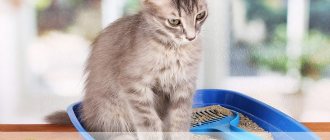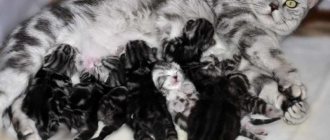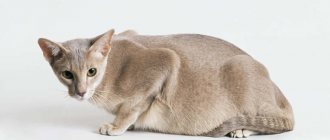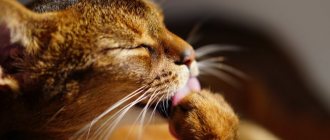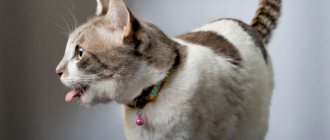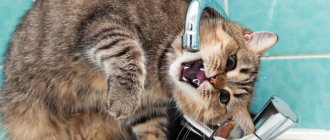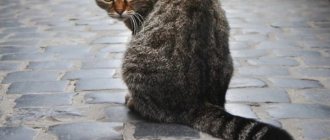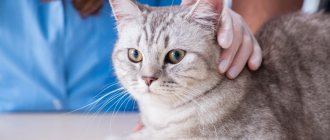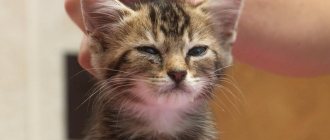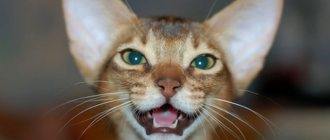Age: any
Symptoms: change in behavior, atypical aggression, refusal to eat, refusal of the animal to care for itself, reluctance to make contact, and others
We are accustomed to the fact that depression is a problem for people, but it turns out that our pets, in particular cats, can also suffer from this disease. Veterinary medicine encounters depression in cats quite often, although not all owners are aware of this problem. So what is it - depression in a cat ?
What can cause depression in a cat?
- Moving to a new place of residence. Cats are conservative creatures and often react negatively to changes in their lives. It takes them a long time to get used to new surroundings, new people, and smells. All this can disturb their peace and lead to depression.
- Disappearance of a loved one. Cats get used to a certain circle of people. They love some, they tolerate others, but if the composition of the family has changed, especially if the beloved owner is gone, the cat may experience severe anxiety. A similar condition occurs in dogs.
- Lack of attention. Domestic cats are very social. They need their owner's attention every day and if they don't receive it, they begin to get bored. This is especially evident in Siamese cats, which are more likely than others to become attached to people.
Remember the latest changes
If your cat is showing signs of depression, you need to think about what changes have happened in the house recently. Stability and a calm environment are very important for cats; any changes can upset the pet’s psychological balance.
Moving to another home, as well as separation from someone close (human or other animal) can be stressful and negatively affect the cat's condition.
Owners should also consider whether they are paying enough attention to their furry friend. Cats, despite their apparent independence, are mostly social animals. They need communication with their owners, care, affection and attention. In the absence of this, they may become depressed.
How to suspect depression in a cat?
- Behavior has changed. All cats have their own character, habits and habits, but if you notice that your pet’s behavior has changed significantly: he began to eat less or more, sleep, meow, this is a reason for concern.
- The cat has stopped grooming himself, his fur is dirty and looks sloppy. Or, on the contrary, the animal constantly licks itself nervously. All of these can be signs of depression.
- Noticeable hair loss, bald spots. Here it is necessary to differentiate the condition from seasonal molting.
- The cat began to defecate past the tray.
- Aggressive behavior: the cat began to bite, scratch, and hiss. All this indicates mental health problems in the animal.
- You should also suspect something is wrong if the cat suddenly begins to lead an overly solitary lifestyle: it often hides and is reluctant to make contact.
- Lethargy, apathy, decreased interest in the environment - all these are clear signs that the cat is bored.
Treatment
Unfortunately, there are no specialized drugs developed for cats. In severe cases, the veterinarian may prescribe medications from the category of antidepressants: MAO or SSRI. But these drugs have serious side effects and it is better to try to do without them.
First of all, you need to fight the animal's boredom. If a person has acquired a pet, he needs to play with him more often, talk, comb him, in a word, spend time communicating with the cat. If the cat is left alone for a long time, you need to leave the doors to the rooms open and do not close the curtains. This will allow your pet to have fun while looking outside. Today there are special videos for sale that are designed for cats.
If a cat has seasonal depression, veterinarians advise purchasing a white lamp and turning it on for several hours in the presence of the animal. Such lamps are used in greenhouses. Veterinarians recommend artificial pheromones for some cats. This will lift your pet's mood and ease depression. If an animal shows aggression, it may be prescribed sedatives.
Diagnostics
It is important to understand that it is impossible to independently diagnose depression in an animal, since all the signs of this illness can accompany a number of diseases, many of which pose a serious threat to the health and life of the pet. Therefore, if you notice that your cat is behaving strangely, do not put off a visit to the veterinary clinic. Doctors will examine your animal, take tests, check the condition of internal organs, and if the cat turns out to be physically healthy, then a mental disorder can be considered the probable cause of deviations in its behavior.
Causes
Hormones
Often depression in cats is provoked not by external factors, but by hormonal changes associated with the functioning of the reproductive system. This can especially happen after sterilization or castration. It should be noted that after this operation, pets, even aggressive ones, become affectionate and calm, but depression may also occur, which can develop into depression.
Also, during sexual heat, cats may experience depression, which is a completely natural phenomenon. In this case, the owner just needs to be gentle and patient with his pet, there is no need for additional treatment, everything will go away on its own when the hormonal levels stabilize.
Postpartum
Cats may experience depression, also caused by a surge in hormones, during pregnancy and after giving birth.
Important!
This can be quite dangerous, because in a state of passion, a mother cat can attack the kittens or simply abandon them to their fate.
In addition, severe stress, and resulting depression, can occur if a cat has lost her newborn kittens.
Will or captivity?
Some experts believe that mental disorders in animals may appear due to the fact that they are cut off from their natural habitat.
Natural predators, who have it in their blood to hunt and fight for territory, lie at home on the couch and are bored, and because of this, their hormonal levels are disrupted.
This theory looks quite logical, but is still controversial and has many opponents. After all, the street is fraught with a lot of dangers for a pet - cars, dogs, knackers, the risk of contracting an infectious disease or picking up parasites.
And for a cat who is accustomed to a cozy home and a soft sofa, such a change of environment can cause even more stress.
How to treat depression in a cat?
First of all - attention. Offer your pet a game, pet it gently, and talk in a calm voice. The animal must feel safe and psychologically comfortable. Treat your cat to his favorite treat, arrange a comfortable place for sleep and privacy. In general, provide excellent care for your cat throughout. Eliminate all stressors as much as possible. Also, to normalize the condition, the doctor may prescribe general strengthening drugs and medications to correct the animal’s mental state. Medicines are selected on an individual basis.
Also, often in cases where the owner does not have the opportunity to provide the animal with proper care, but communication and attention, or if a sociable cat is too hyperactive for the owner, it is often recommended to get another animal so that the cat does not feel lonely when you are busy or absent. You shouldn’t be afraid that the animal will completely switch from you to its new playmate, but you should remember that everyone’s characters are individual and a lot depends on you, too. If the animal is very jealous, you still shouldn’t resort to such a solution - it can aggravate the situation. We should also not forget about the possibility that animals may not get along with their personalities, including among themselves.
The doctors at the Amis clinic are ready to provide your cat with qualified care. Come and we will select an effective course of treatment for your pet.
Signs and symptoms
Boredom and excessive sleepiness are not always a sign of depression. This happens to all pets from time to time. It is worth paying attention to the following symptoms:
- state of anhedonia. In simple words, the cat becomes indifferent to everything, it ceases to be pleased with what previously brought it pleasure: delicious food, treats, toys, etc.;
- sudden changes in behavior, actions become completely strange and illogical. An affectionate pet suddenly becomes aggressive, while a restless and active pet develops apathy;
- the animal stops performing actions previously familiar to it;
- sometimes cats begin to lick their fur too intensively, until wounds appear, or they stop going to the litter box;
- the pet becomes insecure, this manifests itself in the form of a desire to protect itself, its offspring, territory, bowl, etc. This may be accompanied by anger, apathy, and fear.
The animal strongly waves its tail
A cat's depression quickly shows in its behavior - just look at its tail. In a happy animal it moves gently and carefully, but in a depressed animal it twitches sharply and strongly. Try to monitor the animal to determine the source of the discomfort. Cats quickly develop certain habits and don't like change, so think about what might have changed recently. Perhaps this will help.
Why do doubts arise?
The modern world is overflowing with possibilities—pleasures and disappointments. Psychotherapists are becoming increasingly valuable specialists, since in nature everything is cyclical, the higher a person flies, the more painful it is for him to fall.
Somatic disorders are diagnosed at every step, depression leads “in all respects.” Naturally, in response to demand, pharmaceutical companies produce the necessary drugs, which leads to good income.
Marketers working in the field of veterinary medicine and animal products are aware of the fact that owners tend to humanize their pets. This fact is known to everyone and does not need proof. And now the question is: can depression in cats act as a false diagnosis to make money?
Why not, there is a diagnosis, which means that the need for specific medications will arise and will increase.
Let’s not drag our feet, cats can suffer from psychosomatic disorders, but (!) this phenomenon is not universal and is difficult to diagnose. “Businessmen,” on the other hand, expand the symptoms of depression in a cat to a “blurred framework” and, in fact, “help” is imposed on any healthy but melancholic animal.
Medicines and even animal psychologists (the number of which has recently been growing at an alarming rate) “work” to eliminate false messages. However, let’s not get ahead of ourselves and hang labels; first, let’s understand the basics.
Note! Mental, physical and psychosomatic disorders are three different concepts that are too often confused. There is no dispute that violations can be connected (or come from one another).
In short: with a mental disorder, the thought processes and soul are affected, with a somatic disorder, the body is affected, and psychosomatics is the process when a disease of the body causes a mental disorder or vice versa.
Stress factors
Loneliness and lack of attention from the owner can negatively affect a cat's health.
Many people are accustomed to thinking that stressors can only be psychological in nature, but in fact there are several types:
- Physical - the impact of temperature on the cat (burn, frostbite, sudden change from cold to hot and vice versa), humidity, sunstroke, electric shock, painful injuries with extensive damage to the body and heavy bleeding.
- Chemical - this group includes any toxic or irritating substances that can lead to poisoning (household chemicals, medications, etc.). By the way, even tobacco smoke blown into a cat’s nose for the sake of a joke, or the smell of alcohol can cause stress.
- Biological – prolonged fasting, insufficient supply of nutrients and vitamins, infections of any etiology (viruses, fungi, bacteria).
- Mental stressors are probably the largest and most common group of stressors in cats, which would be worth dwelling on in a little more detail.
